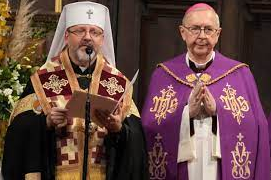
Prime Minister and Church Leaders Honour Victims of 1943-44 Massacres, Acknowledging the Wounds in Polish-Ukrainian Relations
Poland has begun a series of commemorative events to honour the victims of the 1943-44 massacres of tens of thousands of Poles by Ukrainian nationalists during World War II, a dark chapter in history that has long strained Polish-Ukrainian relations. The observances were marked by Polish Prime Minister Mateusz Morawiecki and Catholic Church leaders, who are seeking to bring the truth of these atrocities to the forefront.
Rafal Bochenek, spokesperson for Poland’s ruling party, described the massacres as “an unhealed wound in Polish-Ukrainian relations” and called for the historical truth to be acknowledged. Poland has long maintained that the massacres, which took place in the Volhynia region and other areas of what was then eastern Poland (now part of western Ukraine), amounted to genocide. Nationalist Ukrainian forces, in their attempt to create an independent Ukrainian state, carried out brutal attacks, destroying entire villages and killing around 100,000 Poles.
Though Poland has strongly supported Ukraine in its fight against Russian aggression, the painful memories of the past still linger. Polish Prime Minister Morawiecki travelled to Ukraine on Friday to visit key sites of the massacres, including the villages of Ostrowki and Puzniki, where many of the victims perished. He laid commemorative crosses and visited cemeteries where some victims are buried, vowing to ensure that every victim of the Volhynia Massacre is properly found and laid to rest.
In Warsaw, a joint religious service was held by the leaders of Poland’s Roman Catholic Church, Archbishop Stanislaw Gadecki, and Major Archbishop Sviatoslav Shevchuk of the Ukrainian Greek Catholic Church. These observances will culminate on Tuesday, marking the 80th anniversary of the heightened violence.
Poland has repeatedly sought Ukraine’s permission to search for burial sites and carry out exhumations and identifications of victims. This effort to uncover the truth is seen as an essential part of the healing process for both nations, with Polish leaders arguing that failing to address the past could be used by external forces, especially Russia, to drive a wedge between the two countries.
For Poland, the pursuit of full clarity about the Volhynia massacres is seen not only as an act of justice for the victims but also as a means to strengthen Polish-Ukrainian relations, ensuring that these wounds do not continue to be exploited by third parties.










